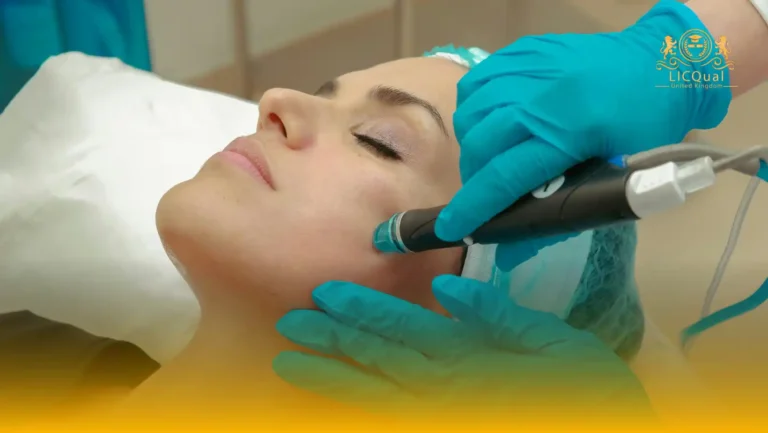The LICQual Level 6 Diploma in Endocrinology (Dip E) is a specialized qualification designed for healthcare professionals seeking to expand their knowledge and skills in the diagnosis, management, and treatment of endocrine disorders. This advanced-level diploma provides learners with in-depth understanding of hormonal imbalances, metabolic conditions, and endocrine-related diseases that significantly impact global health.
This programme is not intended for fresh candidates, but rather for medical professionals, clinicians, and healthcare practitioners who already possess relevant experience and wish to enhance their career prospects, broaden their expertise, and actively contribute to patient care through advanced clinical practice. The course also plays a vital role in supporting Continuing Professional Development (CPD), enabling learners to remain at the forefront of modern endocrinology.
Learners will explore key areas including diabetes, thyroid disorders, adrenal and pituitary dysfunction, reproductive endocrinology, and emerging trends in endocrine research. The course blends theoretical knowledge with evidence-based practices, equipping learners with the clinical competence required to manage complex endocrine cases with confidence.
Centres delivering this qualification must ensure they have highly qualified and experienced staff, along with appropriate learning materials, academic resources, and structured support systems. This ensures that every learner benefits from a high-quality educational experience that aligns with international standards and best practices in endocrinology training.
By completing this diploma, learners will gain advanced expertise, strengthen their professional profile, and play a pivotal role in improving patient outcomes in the field of endocrine healthcare.
Course Overview
Qualification Title
LICQual Level 6 Diploma in Endocrinology (Dip E)
Total Units
6
Total Credits
120
GLH
480
Qualification #
LICQ2200943
Qualification Specification
To enroll in the LICQual Level 6 Diploma in Endocrinology (Dip E), applicants must meet the following criteria:
|
Qualification# |
Unit Title |
Credits |
GLH |
|---|---|---|---|
|
LICQ2200943-1 |
Foundations of Endocrinology and Hormonal Regulation |
20 |
80 |
|
LICQ2200943-2 |
Diagnostic Approaches in Endocrine Disorders |
20 |
80 |
|
LICQ2200943-3 |
Diabetes Mellitus and Metabolic Disorders |
20 |
80 |
|
LICQ2200943-4 |
Thyroid, Adrenal, and Pituitary Disorders |
20 |
80 |
|
LICQ2200943-5 |
Reproductive Endocrinology and Growth Disorders |
20 |
80 |
|
LICQ2200943-6 |
Advanced Therapeutics and Research in Endocrinology |
20 |
80 |
By the end of this course, learners will be able to:
Unit 1: Foundations of Endocrinology and Hormonal Regulation
By the end of this unit, learners will be able to:
- Critically analyse the anatomy and physiology of the endocrine system.
- Explain the mechanisms of hormonal secretion, signalling, and feedback regulation.
- Evaluate the role of hormones in maintaining homeostasis, metabolism, and growth.
- Interpret the systemic effects of hormonal imbalances on human health.
Unit 2: Diagnostic Approaches in Endocrine Disorders
By the end of this unit, learners will be able to:
- Assess key diagnostic tools, including hormonal assays, imaging techniques, and laboratory tests.
- Interpret biochemical markers for accurate diagnosis of endocrine conditions.
- Apply evidence-based approaches to differential diagnosis of complex disorders.
- Critically evaluate the strengths and limitations of current diagnostic methodologies.
Unit 3: Diabetes Mellitus and Metabolic Disorders
By the end of this unit, learners will be able to:
- Explain the pathophysiology and classification of diabetes and related metabolic disorders.
- Evaluate clinical management strategies, including pharmacological, dietary, and lifestyle interventions.
- Assess short- and long-term complications of diabetes and their preventive measures.
- Critically analyse advancements in diabetes care and patient self-management strategies.
Unit 4: Thyroid, Adrenal, and Pituitary Disorders
By the end of this unit, learners will be able to:
- Demonstrate understanding of disorders affecting thyroid, adrenal, and pituitary glands.
- Evaluate clinical presentations, diagnostic pathways, and treatment strategies.
- Analyse the systemic implications of hormonal imbalances.
- Formulate evidence-based management plans for patients with endocrine gland disorders.
Unit 5: Reproductive Endocrinology and Growth Disorders
By the end of this unit, learners will be able to:
- Explain the hormonal regulation of fertility, pregnancy, and reproductive health.
- Analyse the endocrine influences on puberty, growth, and development.
- Evaluate clinical conditions such as polycystic ovary syndrome, hypogonadism, and growth hormone deficiencies.
- Apply clinical knowledge to assess, diagnose, and manage reproductive and growth-related disorders.
Unit 6: Advanced Therapeutics and Research in Endocrinology
By the end of this unit, learners will be able to:
- Critically evaluate modern treatment protocols, including hormone replacement therapy and targeted biologics.
- Analyse emerging technologies and innovations in endocrine medicine.
- Apply evidence-based practices to improve patient care and treatment outcomes.
- Develop research-informed perspectives on the future of endocrinology and clinical applications.
The LICQual Level 6 Diploma in Endocrinology (Dip E) is designed for healthcare professionals, doctors, nurses, and medical students who want to expand their expertise in endocrinology and metabolic medicine. This advanced Level 6 qualification is ideal for individuals looking to gain a deeper understanding of hormonal disorders, improve patient care, and advance their medical careers through a globally recognized program. Whether you are working in clinical practice, research, or healthcare management, this diploma offers the essential knowledge and professional edge to grow in the field of endocrinology.
Doctors and Physicians
- Designed for medical practitioners aiming to specialize in endocrinology and metabolism.
- Enhances diagnostic and treatment skills for endocrine and hormonal disorders.
- Builds advanced understanding of diabetes, thyroid, and adrenal gland diseases.
- Strengthens evidence-based clinical decision-making and patient management.
- Offers international recognition to support career progression and credibility.
Nurses and Clinical Practitioners
- Perfect for nurses seeking to expand their knowledge in hormonal and metabolic health.
- Improves patient assessment and care planning for endocrine-related conditions.
- Builds confidence in managing chronic illnesses like diabetes and thyroid disorders.
- Encourages leadership in endocrine and metabolic care units.
- Supports continuing professional development (CPD) through an accredited qualification.
Medical Students and Postgraduate Trainees
- Suitable for medical graduates preparing for specialization in endocrinology.
- Provides a strong foundation in endocrine physiology and hormonal regulation.
- Enhances research and clinical reasoning skills for postgraduate medical training.
- Develops understanding of complex endocrine system interactions.
- Equips learners with recognized credentials to pursue advanced study or residency.
Healthcare Managers and Administrators
- Ideal for healthcare professionals managing clinical operations or endocrine care programs.
- Improves understanding of healthcare delivery in endocrine and metabolic medicine.
- Strengthens leadership and planning in clinical service management.
- Helps integrate endocrine care policies and best practices into hospital systems.
- Supports organizational quality improvement in patient outcomes.
Public Health and Community Health Professionals
- Designed for professionals focused on public health approaches to endocrine disorders.
- Builds awareness of endocrine disease prevention and health promotion.
- Enhances ability to design and implement community health programs.
- Strengthens epidemiological knowledge in diabetes and metabolic syndromes.
- Promotes population-level strategies for better endocrine health outcomes.
Allied Health Professionals
- Tailored for dietitians, laboratory technologists, and physiotherapists.
- Improves understanding of hormonal influences on nutrition, metabolism, and therapy.
- Encourages collaboration in multidisciplinary endocrine care teams.
- Strengthens diagnostic and analytical skills in endocrine function testing.
- Promotes career growth in specialized healthcare sectors.
International Healthcare Professionals
- Suitable for global learners seeking UK-recognized endocrinology training.
- Offers flexible online learning to balance work and study effectively.
- Provides updated international guidelines in endocrinology and metabolism.
- Builds global competitiveness and credibility in healthcare.
- Recognized qualification to enhance international medical career opportunities.
Centres delivering the LICQual Level 6 Diploma in Endocrinology (Dip E) must adhere to high standards of academic and professional quality to ensure learners receive comprehensive, practical, and evidence-based training. The following requirements are essential for centres to provide a successful learning environment:
- Qualified and Experienced Staff
Tutors, trainers, and assessors must hold relevant qualifications and professional experience in endocrinology, internal medicine, or related healthcare fields. Staff should demonstrate expertise in teaching and assessing at Level 6 or higher. - Access to Comprehensive Learning Resources
Centres must provide learners with up-to-date textbooks, journals, case studies, e-libraries, and online learning platforms to support in-depth study and research. - Clinical and Practical Facilities
Where applicable, centres should have access to clinical environments, laboratories, or partnerships with healthcare institutions to provide practical exposure and hands-on learning opportunities. - Robust Quality Assurance Systems
Internal quality assurance processes must be in place to ensure consistent assessment, fair evaluation, and adherence to international standards in healthcare education. - Learner Support and Guidance
Centres must offer academic mentoring, administrative support, and structured guidance to help learners achieve their full potential throughout the programme. - Technology and Digital Infrastructure
Centres should provide reliable digital tools, virtual classrooms, and blended learning platforms to facilitate flexible learning and effective engagement.
By meeting these requirements, centres can deliver a high-quality educational experience, equipping learners with the advanced skills, knowledge, and professional competence necessary to excel in endocrinology and contribute meaningfully to patient care.
Assessment and Verification
All units within this qualification are subject to internal assessment by the approved centre and external verification by LICQual. The qualification follows a criterion-referenced assessment approach, ensuring that learners meet all specified learning outcomes.
To achieve a ‘Pass’ in any unit, learners must provide valid, sufficient, and authentic evidence demonstrating their attainment of all learning outcomes and compliance with the prescribed assessment criteria. The Assessor is responsible for evaluating the evidence and determining whether the learner has successfully met the required standards.
Assessors must maintain a clear and comprehensive audit trail, documenting the basis for their assessment decisions to ensure transparency, consistency, and compliance with quality assurance requirements.







